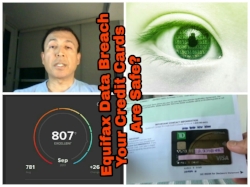West African Letter Scam
In my book Invest Now I dedicated a whole chapter to Internet Scams. West African letter Fraud is a common form of Internet scam. You receive a letter in the mail convincing you to give out your personal information, and then scammers empty out your bank account. This type of scam can come from anywhere, in any form. It does not have to come from West Africa. Today I have a perfect example of West African Scam to post. I just got this email and picture in my mail box. First, I am going to give you an excerpt from Invest Now, and then I will show you the letter and picture I received.
The following is an Excerpt from my first book Invest Now. Invest Now is jam-packed with timely information and timeless advice for the beginning Canadian investor. Invest Now covers a broad range of topics including Internet Scams. To purchase a copy, visit Chapters Indigo or click here to buy online - Invest Now: A Canadian's Guide to Investing
The Excerpt
West African letter fraud: You meet a 20-something-year-old girl in a chat room. She sends you a few hot pictures. Then she mentions that her dad was a high-ranking government official or industrialist who left her millions of dollars. She explains that she is not able to move this fund from her dad’s account due to regulations, and she needs your help. All you have to do is to give her your bank-account information to transfer her money out of the country; in return, she will give you 40 or 50% of her 10 or 20 million dollars. Wait, even more incentives remain. Since you are such a nice guy, she even would not mind spending a couple of months in a resort with you. You don’t waste a second to grab this lifetime opportunity, handing over your banking information. A few days later, you find out that your bank account was emptied out. Your dream of spending quality time with a beautiful girl as a freshly minted millionaire is gone—and so is all the money in your bank account. Sometimes, the scammer claims to be from Nigeria, but it’s always the same scam. Be aware.
A Perfect Example
from Angie Keong <giveslife@yahoo.com>
reply-to giveslife02@yahoo.com,
to giveslife@yahoo.com,
date Wed, Apr 23, 2008 at 3:37 PM
subject FROM MRS.ANGIE KK
mailed-by yahoo.com
signed-by yahoo.com
Images from this sender are always displayed. Don't display from now on.
hide details 3:37 PM (4 hours ago)
Reply
FROM MRS.ANGIE KK
THE CRY OF A WIDOW
Do accept my sincere apology if contacting you through this medium goes against your moral values and code of conduct. My name is Mrs. Angie KK, the wife of late Mr. Sherif Keong who happen to be an international business man dealing mainly in contracting.There is something I personally need your urgent attention and assistance in, hoping that you are living well with your family over there in your country. I want you to personal assist me to safeguard a reasonable sum to your country or any other place where you are familiar with for a productive investment. The fund were generated through a legal means by my late husband but due to some issue between my late husband and few foes, I am mandated to make this transfer and the onward investment on my own.
The fund in question is the sum of Twenty One Million United State of American Dollars which was deposited on a vault by late husband in a Financial Institute, and it is due to be transferred, but the major problem I was facing for quite a long time now is finding a capable person who will help me to make the transfer, and also negotiate some areas of lucrative investment down on-behalf of my son Franklin
Due to my medical condition(Cancer of the large Intestine which was not noticed at the early stage) and situation of things around me, I can't effect the conveying of the project on my own and for the safety of my son without an aid of someone. This was the major reason that drew my attention to contact you personally for an assistant regarding the execution of this project. I am in a critical position since the doctors have confirmed that the cancer was not noticed at the early stage and it is only a miracle that can heal me. Thus, I am doing all this because I want my son to have a future incase if anything happens to me.
I will give you all the necessary information you would require to know about this project when I read from you. I will be expecting to hear from you any moment from now
Regards
Mrs. Angie Keong
The Lesson
Do not give out any financial or personal information in an e-mail or chat room.
First Published: ADawnJournal.com Apr 24, 2008
















